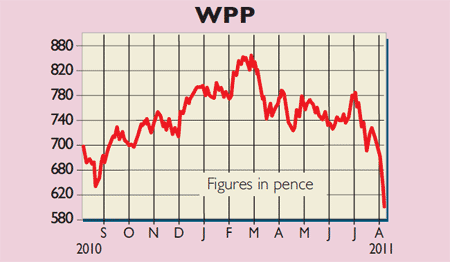Get the latest financial news, insights and expert analysis from our award-winning MoneyWeek team, to help you understand what really matters when it comes to your finances.
You are now subscribed
Your newsletter sign-up was successful
Want to add more newsletters?

Twice daily
MoneyWeek
Get the latest financial news, insights and expert analysis from our award-winning MoneyWeek team, to help you understand what really matters when it comes to your finances.

Four times a week
Look After My Bills
Sign up to our free money-saving newsletter, filled with the latest news and expert advice to help you find the best tips and deals for managing your bills. Start saving today!
Advertising has long been seen as the preserve of traditional print, radio and television campaigns. But what about the expanding world of new media? Take WPP, where digital is growing at an 8% clip and accounts for 27% of revenues, with the aim being to increase this to 35%-40% over the next few years.
A tremendous opportunity awaits, driven by social networks (Facebook, Twitter, YouTube), mobile and online promotions. Another major draw for WPP is its geographical footprint. It is the world's largest advertising agency, with only 12% of revenues derived from Britain. That's less than half the amount produced from emerging markets, which grew at an eye-popping 11.5% in the first quarter of 2011.
Indeed, CEO and founder Sir Martin Sorrell describes the spread of WPP's divisions in English football terms. The BRIC countries including Indonesia and Turkey are in the Premier League, the US in the Championship, and sloth-like western Europe in the next division down.
MoneyWeek
Subscribe to MoneyWeek today and get your first six magazine issues absolutely FREE

Sign up to Money Morning
Don't miss the latest investment and personal finances news, market analysis, plus money-saving tips with our free twice-daily newsletter
Don't miss the latest investment and personal finances news, market analysis, plus money-saving tips with our free twice-daily newsletter
Overall, the mix is working, with top-line organic growth expected to be 6% in 2011. In April, the board also reaffirmed guidance that the operating margin would continue to rise by 0.5% over each of the next two years. Sir Martin reiterated the new dividend policy indicating that the payout ratio would rise to 40% of earnings from the current 33%.
WPP (LSE: WPP), rated a BUY by Liberum Capital.

But that's not all. Next year brings the US presidential election, the London Olympics and the European football tournament, adding 1%-2% to global advertising spending. WPP has also de-leveraged its balance sheet, following the acquisition of TNS in November 2008 for £1.2bn. It has now achieved one of its medium-term objectives by reducing the net debt (£2.3bn) to EBITDA ratio to two, aided by robust cash generation.
In terms of the figures, the City is predicting 2011 turnover and underlying EPS of £9.8bn and 63p respectively, rising to £10.3bn and 70p in 2012. That puts the shares on average p/e multiples of ten and nine, alongside a 2.5% dividend yield. Instead, I would rate the group on "a through-cycle" earnings before interest, tax and amortisation (EBITA) of ten. Adjusted for debt and a £241m pension deficit that delivers an intrinsic worth of 750p.
The main threat comes from western Europe (24% of revenues). The sovereign debt crisis could trigger another banking meltdown. Another fear is that WPP may overpay if it decides to bid for Aegis' market research business, Synovate, which is on the block and valued at about £500m. 2013 could also be mixed if both the US and European government deficits are tackled simultaneously.
All the same, the group's breadth of operations and geographical spread leaves it reasonably well insulated. Liberum Capital has a £10 target price, with interims scheduled for 24 August.
Rating: BUY at 620p
Get the latest financial news, insights and expert analysis from our award-winning MoneyWeek team, to help you understand what really matters when it comes to your finances.
Paul gained a degree in electrical engineering and went on to qualify as a chartered management accountant. He has extensive corporate finance and investment experience and is a member of the Securities Institute.
Over the past 16 years Paul has held top-level financial management and M&A roles for blue-chip companies such as O2, GKN and Unilever. He is now director of his own capital investment and consultancy firm, PMH Capital Limited.
Paul is an expert at analysing companies in new, fast-growing markets, and is an extremely shrewd stock-picker.
-
 Should you buy an active ETF?
Should you buy an active ETF?ETFs are often mischaracterised as passive products, but they can be a convenient way to add active management to your portfolio
-
 Power up your pension before 5 April – easy ways to save before the tax year end
Power up your pension before 5 April – easy ways to save before the tax year endWith the end of the tax year looming, pension savers currently have a window to review and maximise what’s going into their retirement funds – we look at how